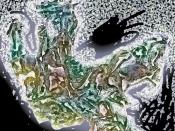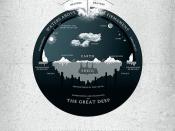"I think that it's important for scientists to explain their work, particularly in cosmology. This now answers many questions once asked of religion."
Prof. Stephen Hawking, Interview with The Guardian (UK) September 27, 2005
Cosmology is the metaphysical study of the structure and nature of the universe as a whole. Cosmogony is the branch of ancient philosophy concerned with the origins of the universe. Since the beginning of recorded history (and no doubt before) humans have been fascinated by the questions posed by cosmological enquiry and investigations concerning the birth of our universe. Often wrong, but never uncertain, humans have believed many incompatible answers, but there have been certain common patterns and rationales in these conclusions. The differences in these conclusions possibly reflect differences in the economy, social order, and the environment of the different civilisations. This essay shall be primarily concerned with the developments in presocratic thought, specifically that of the Ionian rationalists.
For prior to the development of Greek civilisation, although men no doubt speculated on the world beyond their immediate experience, no records of their enquiries survive.
This study shall start by briefly looking at the forerunners of philosophical cosmology, with emphasis being placed upon the writings of the epic poets Homer and Hesiod . In the Illiad and the Odyssey, although not directly addressing ideas on cosmogony, Homer considers the Gods as being involved with daily life.
In Hesiod's Theogony , the writer deals with the birth of the gods (Cf. Hes. Theog. 116), resulting in the formation of several bodies, and by keeping them united the history of the Greek gods as well as the creation of the Universe (Cf. Hes. Theog. 116 "...Chaos did come into being, and then broad-bosomed Gaia [earth], a firm seat of all things for ever..."). The role of the...


